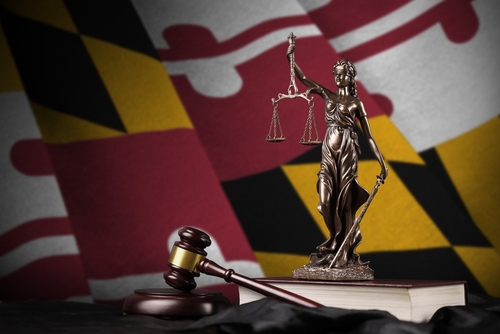Judge's 'Beowulf' and Whistler's mother references raise concerns with Maryland justices

Image from Shutterstock.
An appeals judge who compared a Black defendant to a monster in the epic poem Beowulf used language that could be interpreted as evoking racial stereotypes, according to the Maryland Supreme Court.
The state supreme court ruled in an appeal by Terrance Belton, who contended that the appellate opinion comparing him to the mythical monster Grendel evoked racist tropes of African Americans as subhuman.
“Judges must vigilantly guard both their actual impartiality and their appearance of impartiality,” the state supreme court said in its May 31 opinion. “In the appellate context, this requires careful contemplation of how the language of our opinions may be taken, including how this country’s tortured racial history may make otherwise benign literary and artistic references land on modern ears.”
Belton had contended that the constitutional guarantee of a fair trial extends to appellate proceedings, and the language used in the opinion violated his due process rights under the Fifth Amendment.
The state supreme court agreed that the fair-trial guarantee extends to appellate proceedings. But the state supreme court didn’t decide whether the Beowulf comparison and other language violated Belton’s constitutional rights because it overturned his manslaughter conviction and ordered a new trial on other grounds.
The Maryland Daily Record has coverage of the decision via How Appealing.
Senior Judge Charles E. Moylan Jr. wrote the appellate opinion. According to the Maryland Daily Record, he is known for his use of literary references and flowery language in opinions. The Maryland Supreme Court said Moylan has “justifiably been regarded in Maryland and beyond as one of the finest writers of appellate opinions.”
Moylan’s descriptions put his gloss on the facts of the case.
Belton’s mother and the victim in the case were neighborhood drug dealers, according to the state supreme court. The victim had declared: “This is my block,” when Belton arrived in the neighborhood with his mother. Fearing an aggressive move by the victim, Belton suggested a fist fight. But Belton’s mother started swinging at the victim first to protect her son. The victim fought back and gained the upper hand. Belton said he saw the victim approach him and take a handgun out of his pants, prompting Belton to begin shooting because he feared for his life.
The state supreme court said the trial judge erred when he barred testimony about the victim’s “This is my block” comment.
Here is what Moylan wrote in the first paragraph of his opinion: “In the Old English epic of Beowulf, the peace and tranquility of Hrothgar’s Hall was initially shattered by the unexpected appearance of the monster Grendel. It was, even more direly, terrorized by the subsequent arrival of Grendel’s mother. In the case now before us, the peace and tranquility of South Monroe Street at McHenry Street was ruptured on Dec. 6 of 2018 by the simultaneous appearances of both the son, Terrence Belton, and the mother, Shakiea Worsley. Literary scholars tell us that Hrothgar’s Hall was situated in Geatland in what is now the southwestern corner of modern-day Sweden. Police experts tell us that the intersection of South Monroe Street and McHenry Street is an open-air drug market in what is now the southwestern corner of Baltimore City.”
The Maryland Supreme Court said it was certain that Moylan and the two other judges on the panel did not intend to decide Belton’s case based on impermissible factors such as race. But “we must express our concerns about the appellate court’s exercise of discretion in choosing the language of its opinion in this case,” the state supreme court said.
Besides taking issue with the Beowulf reference, the state supreme court criticized Moylan’s opinion for its description of Belton’s mother as a “young and vigorous 35-year-old” to “remove the sentimental stereotype” that Belton was trying to protect his mother.
Belton “may have been in league with his mother, but he was not protecting a helpless old lady from harm,” Moylan had written. “It was not Whistler’s mother selling drugs on South Monroe Street.”
Those comparisons, the Maryland Supreme Court said, “call to mind narratives about African American women as angry and less than virtuous, thereby suggesting that Worsley did not deserve the sympathy that might naturally be extended to the more elderly white mothers and grandmothers depicted by Whistler” and other artists.
Also prompting criticism was a section of Moylan’s opinion that said the intersection where drug dealing took place “was not the Hallmark Hall of Fame.”
“This reference,” the state supreme court said, “could be read as drawing a racialized contrast between the African American neighborhood where the events of this case took place and the mostly white settings traditionally depicted in Hallmark Hall of Fame programs.”



